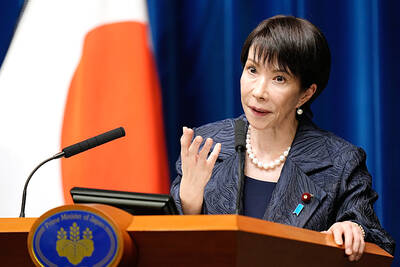More than 80 percent of Taiwan’s workers believe that habits such as drinking and gossiping help them to climb the corporate ladder, according to a recent survey.
The survey on workers’ habits — so-called “gray skills” — conducted by the Taipei-based 360d Human Resources Consultancy Co showed that 79 percent of respondents said they possessed such “skills.”
Among the respondents, 63 percent said they drink and 38 percent said they gossip.
The consultancy defined “gray skills” as the ability to gossip, play cards, chew betel nut, smoke, brown-nose and drink.
Most office workers believe these habits are particularly helpful in “negotiating business deals with clients” and in “closing the gap between bosses and workers.”
When asked if they think these habits — considered antisocial in some quarters — are helpful to them in their job prospects, 81 percent replied positively.
Asked if they worry that not possessing these “skills” could influence the progress they make in the workplace, 72 percent indicated that this was something they worry about.
Meanwhile, about 78 percent of respondents said they would try to hone such skills.
When asked about how the companies they work for stand on the issue, 84 percent of the respondents said firms neither encourage nor discourage employees from developing such habits.
However, around 70 percent of respondents said that their supervisors or colleagues tended to take the initiative in teaching them such “skills.”
Su Yen-chien (蘇晏健), an assistant marketing manager at the consultant company, said professional skills still count for a great deal in terms of workplace success. However, if people are able to employ “gray skills” wisely, they can be important tools in enhancing workplace progress, he added.
The firm conducted a nationwide survey of employees aged 25 to 45 years of age, 60 percent of whom were female, and obtained a total of 1,114 valid responses.

The Ministry of Foreign Affairs (MOFA) yesterday voiced dissatisfaction with the Comprehensive and Progressive Agreement for Trans- Pacific Partnership (CPTPP), whose latest meeting, concluded earlier the same day, appeared not to address the country’s application. In a statement, MOFA said the CPTPP commission had "once again failed to fairly process Taiwan’s application," attributing the inaction to the bloc’s "succumbing to political pressure," without elaborating. Taiwan submitted its CPTPP application under the name "Separate Customs Territory of Taiwan, Penghu, Kinmen and Matsu" on Sept. 22, 2021 -- less than a week after China

THE GOOD WORD: More than 100 colleges on both sides of the Pacific will work together to bring students to Taiwan so they can learn Mandarin where it is spoken A total of 102 universities from Taiwan and the US are collaborating in a push to promote Taiwan as the first-choice place to learn Mandarin, with seven Mandarin learning centers stood up in the US to train and support teachers, the Foundation for International Cooperation in Higher Education of Taiwan (FICHET) said. At the annual convention of the American Council on the Teaching of Foreign Languages held over the weekend in New Orleans, Louisiana, a Taiwan Pavilion was jointly run by 17 representative teams from the FICHET, the Overseas Community Affairs Council, the Steering Committee for the Test of Proficiency-Huayu, the

A home-style restaurant opened by a Taiwanese woman in Quezon City in Metro Manila has been featured in the first-ever Michelin Guide honoring exceptional restaurants in the Philippines. The restaurant, Fong Wei Wu (豐味屋), was one of 74 eateries to receive a “Michelin Selected” honor in the guide, while one restaurant received two Michelin stars, eight received one star and 25 were awarded a “Bib Gourmand.” The guide, which was limited to restaurants in Metro Manila and Cebu, was published on Oct. 30. In an interview, Feng Wei Wu’s owner and chef, Linda, said that as a restaurateur in her 60s, receiving an

MORE RETALIATION: China would adopt a long-term pressure strategy to prevent other countries or future prime ministers following in Sanae Takaichi’s steps, an academic said Taiwan should maintain communications with Japan, as Japanese Prime Minister Sanae Takaichi is to lead a revision of security documents, Taiwanese academics said yesterday. Tensions have risen between Japan and China over remarks by Takaichi earlier this month that the use of force against Taiwan would constitute a “survival-threatening situation” for Japan. Prospect Foundation president Lai I-chung (賴怡忠) yesterday said Takaichi’s stance regarding Taiwan is the same as past Japanese prime ministers, but her position is clearer than that of her predecessors Fumio Kishida and Shigeru Ishiba. Although Japan views a “Taiwan contingency” as a “survival-threatening situation,” which would allow its military to